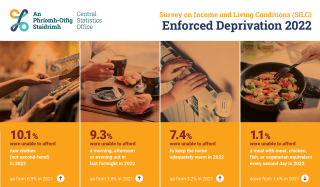Almost 900,000 people forced to go without in 2022, of which nearly 250,000 are children

The deprivation figures published in today’s Survey of Income and Living Conditions show that just over 876,000 people still struggle to achieve a basic standard of living. The yearly increase was more than 184,500 and almost 250,000 children are experiencing deprivation. This shows the impact that the rising cost of living is having on people’s daily lives. The latest figures show that households with one adult and one or more children, those who are unemployed and people not at work due to illness or disability continue to experience the highest rates of deprivation. This is a persistent problem, and one the Government must urgently address.
Deprivation in Ireland 2022 - some key findings:
- 17.1 per cent of the population have experienced enforced deprivation this year.
- 876,125 people were impacted, an increase of 184,538 from 2021.
- 249,696 children in Ireland are experiencing deprivation, an increase of almost 45,000 since 2021.
- Households with one adult and one or more children have the highest deprivation rate: 45.4 per cent.
- People who are unemployed have a deprivation rate: 45 per cent
- People not at work due to a permanent illness or disability have a deprivation rate: 42.7 per cent.
- More than 1 in 3 people living in rented accommodation experience deprivation (34.1 per cent), about three and a half times the rate of those who own their own homes.
- One in two households reported some difficulty in making ends meet this year.
The figures released today offer some insight into living standards across the state. Of particular concern to Social Justice Ireland is the increase in deprivation rates in the most vulnerable groups: one parent households, people with a disability, and people who are unemployed. These groups are among those most impacted by the rising cost of living, and they need support. People in low paid jobs and those in rented accommodation are also experiencing increases in deprivation. Government should immediately support these groups by increasing core social welfare rates, making tax credits refundable and by introducing a Living Wage of €13.85 per hour.
Budget 2023 failed to increase core social welfare rates by €20 per week, the minimum that was required. Social Justice Ireland is calling on Government to immediately provide for an additional €8 (€20 in total) in core social welfare rates. Anything less would mean that Budget 2023 confirms Government has abandoned those who need its help most.
Policy recommendations:
If poverty and deprivation rates are to fall in the years ahead, Social Justice Ireland believes that in the period ahead Government, and policymakers generally, should:
- Immediately provide for an additional €8 per week (€20 in total) in core social welfare rates in the Social Welfare Bill 2022.
- Acknowledge that Ireland has an on-going poverty problem.
- Adopt targets for reducing poverty among particularly vulnerable groups such as children, lone parents, jobless households and those in rented social housing.
- Examine and support viable, alternative policies aimed at giving priority to protecting vulnerable sectors of society.
- Carry out in-depth social impact assessments prior to implementing proposed policy initiatives that impact on the income and public services that many low-income households depend on. This should include the poverty-proofing of all public policy initiatives.
- Recognise the problem of the ‘working poor’. Make tax credits refundable to address the situation of households in poverty which are headed by a person with a job.
- Support the widespread adoption of a Living Wage so that low paid workers receive an adequate income and can afford a minimum, but decent, standard of living.
- Introduce a cost of disability allowance to address the poverty and social exclusion of people with a long-term illness or disability.
- Recognise the reality of poverty among migrants and adopt policies to assist this group, including the full implementation of the White Paper on the Elimination of Direct Provision.
- Accept that persistent poverty should be used as the primary indicator of poverty measurement and assist the CSO in allocating sufficient resources to collect this data.
- Introduce a universal basic income system. No other approach has the capacity to ensure all members of society have sufficient income to live life with dignity.
- Acknowledge the failure to meet repeated policy targets on poverty reduction and commit sufficient resources to achieving credible new targets.
The 'Survey on Income and Living Conditions (SILC):on which these numbers are based, was published today by the CSO.
What is the deprivation rate?
The deprivation rate is measured by the CSO via the Survey on Income and Living Conditions. The deprivation rate measures the proportion of households that are considered to be marginalised or deprived because they cannot afford goods and services which are considered to be the norm for other people in society. Enforced deprivation is where a household experiences two or more of the following 11 deprivation items:
1. Without heating at some stage in the last year
2. Unable to afford a morning, afternoon or evening out in last fortnight
3. Unable to afford two pairs of strong shoes
4. Unable to afford a roast once a week
5. Unable to afford a meal with meat chicken or fish every second day
6. Unable to afford new (not second-hand) clothes
7. Unable to afford a warm waterproof coat
8. Unable to afford to keep the home adequately warm
9. Unable to afford to replace any worn out furniture
10. Unable to afford to have family or friends for a drink or a meal once a month
11. Unable to afford to buy presents for family or friends at least once a year